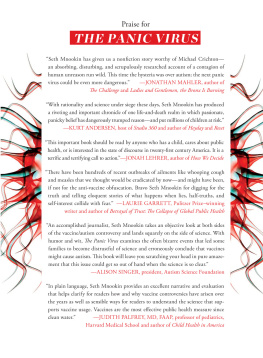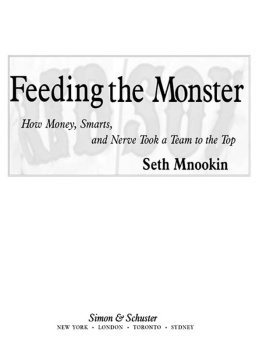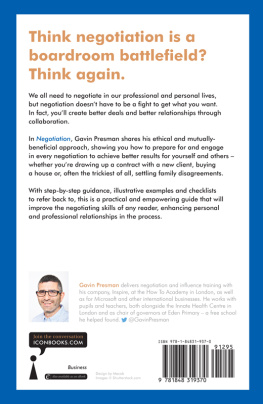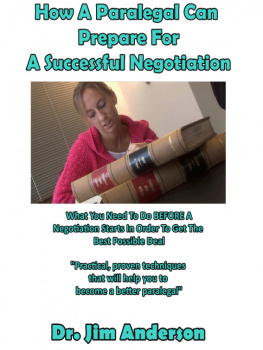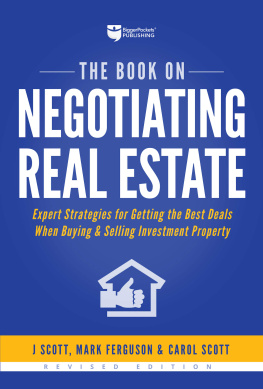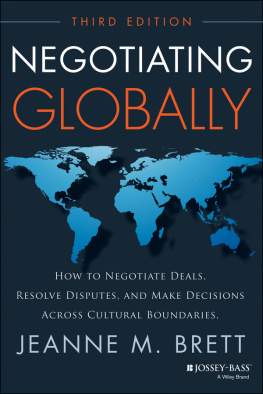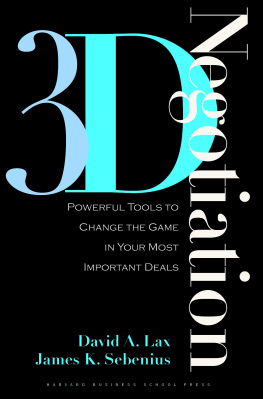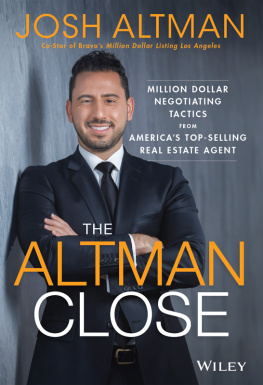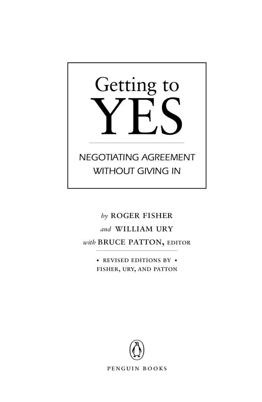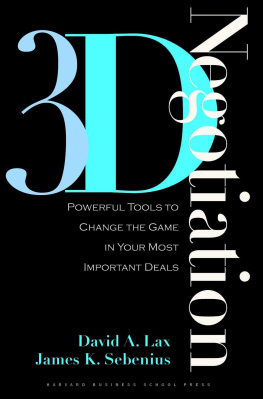BEYOND WINNING
Robert H. Mnookin
Scott R. Peppet
Andrew S. Tulumello
BEYOND WINNING
Negotiating
to Create
Value
in Deals
and Disputes
The Belknap Press of
Harvard University Press
Cambridge, Massachusetts
London, England
Copyright 2000 by Robert H. Mnookin, Scott R. Peppet, and Andrew S. Tulumello
All rights reserved
Printed in the United States of America
Second printing, 2000
Library of Congress Cataloging-in-Publication Data
Mnookin, Robert H.
Beyond winning : negotiating to create value in deals and disputes / Robert H. Mnookin, Scott R. Peppet, Andrew S. Tulumello.
p. cm.
Includes bibliographical references and index.
ISBN 0-674-00335-7 (cloth)
ISBN 0-674-01231-3 (pbk.)
1. Practice of law. 2. Attorney and client. 3. Negotiations. 4. Dispute resolution (Law) 5. Compromise (Law) I. Peppet, Scott R. II. Tulumello, Andrew S. III. Title.
K120.M66 2000
347'.09dc21 00-039787
To Sophia, her parents Jennifer and Joshua, and her aunt and uncle Allison and Cory
R.H.M.
To my father Russell, and in loving memory of my mother Rosemary
S.R.P.
To my mother and father, with love
A.S.T.
Contents
This book makes the case that a problem-solving approach to negotiation offers the most promising means of creating value. Besides helping negotiators better understand the dilemmas they must face, the books goal is to help lawyers and their clients work together and negotiate deals and disputes more effectively. As the senior author, I am taking the prerogative of tracing the books history and the deeply collaborative nature of this Mnookin-Peppet-Tulumello enterprise. Because this project has intellectual and professional roots extending deep into my past, I also want to acknowledge some profound intellectual debts of my own that go back further.
Work on this book began during the spring semester of 1995, when both Scott Peppet and Andrew Tulumello, for independent reasons, were taking time off from law school to work at the Program on Negotiation at Harvard Law School and the Harvard Negotiation Project. Scott and Drew had come to Harvard Law School because of a special interest in negotiation, and both had been brilliant students in my Negotiation Research Seminar the year before. During the spring of 1995 we created an early draft of what eventually became Part I of the book. Recognizing their extraordinary talents and our shared belief that interdisciplinary scholarship could improve practice, I asked each to continue our collaboration after their graduation as my co-authors.
Since graduating from law school in 1996, in addition to clerking, Drew and Scott have spent time with me in Cambridge, teaching negotiation as lecturers at Harvard Law School and working with me on the book, Drew for one academic year (199798), Scott for three (199697; 19982000). Each was a research fellow, supported by the Harvard Negotiation Research Project, thanks in part to a grant from the William and Flora Hewlett Foundation. Drew thereafter went to work at the War Crimes Tribunal at The Hague; he now is an Associate in the Washington, D.C., office of Gibson, Dunn & Crutcher. Scott has recently accepted a position as an associate professor of law at the University of Colorado, beginning fall semester 2000. While in residence, both Scott and Drew were my full partnersdoing research, developing and refining ideas, writing and revising.
My own intellectual and professional commitment to negotiation, of course, began much earlier. Issues of strategic interaction, and non-zero-sum games have fascinated me since my undergraduate days when, as a sophomore concentrating in economics at Harvard College, I was fortunate enough to have Thomas Schelling as a teacher. About a decade later, as a law professor, I investigated how the formal legal system affected the out-of-court negotiations by which most disputes have always been resolved; and later, with Lewis Kornhauser, I wrote an essay on Bargaining in the Shadow of the Law. Since then a good deal of my research and writing has concerned negotiation.
In 1968, when I graduated from law school, there were no courses in negotiation, and scant use was made of economics, psychology, or decision theory either in the law school curriculum or in legal scholarship. How times have changed! During the last twenty years I have had the good fortune of being on the faculty of two universitiesStanford and Harvardboth of which fostered interdisciplinary research and innovative teaching through negotiation programs. Two deans, Paul Brest at Stanford and Robert C. Clark at Harvard, each believe that the academic study of negotiation belongs in a great law school. Their encouragement made a real difference. Once again the William and Flora Hewlett Foundation played a critical role, for both the Program on Negotiation at Harvard Law School (PON) and the Stanford Center on Conflict and Negotiation (SCCN) were launched with support from the Foundation.
As will be apparent to anyone who reads this book (and the end-notes), I owe a special intellectual debt to colleagues from Stanford (with whom I have collaborated over the last fifteen years) and to colleagues from Harvard (with whom all three of us have worked during the past seven years). In 1988 I founded the SCCN with Kenneth Arrow, Lee Ross, the late Amos Tversky, and Robert Wilson. From them I learned how the insights of economics, social psychology, cognitive psychology, and game theory could all provide useful prisms for better understanding negotiation. Together we studied and then wrote about Barriers to Conflict Resolution. During the same period, Ron Gilson showed me how the new institutional economics could contribute to the understanding of deal-making, dispute resolution, and the corporate law firm, and together we wrote a series of articles relating to the legal profession.
I came to Harvard in 1993 and became chair of the steering committee of PON. Work done by PON colleagues well before my arrival in Cambridge provides part of the intellectual foundation for our book. Special thanks go to Roger Fisher, Bill Ury, and Bruce Patton, whose seminal book Getting to Yes put interest-based negotiation on the map; to Howard Raiffa, whose Art and Science of Negotiation showed how a decision-analytic framework and descriptive-prescriptive approach could combine the behavioral insights of psychology with the strategic analysis of economics to offer practical advice; and to James Sebenius and David Lax, whose Manager as Negotiator articulated the negotiators dilemma and whose title suggested a book that focused on the lawyer as negotiator.
Several colleaguessome inside the academy and others in practicegenerously reviewed an entire draft of the manuscript and provided detailed written comments. We are deeply grateful to Max Bazerman, Ed Bernstein, Jennifer Brown, Roger Deitz, Carol Liebman, Michael Moffitt, Richard Reuben, and David Ross for their help. Others helpfully commented on specific portions relating to their expertise. Ronald Gilson and Victor Goldberg focused on those portions relating to deals. Deborah Rhode commented on what became Chapter 11s discussion of ethics. Marc Victor, an expert on litigation risk analysis, read those portions of Chapters 4 and 9 dealing with the application of decision analysis to litigation. David Hoffman, an experienced family lawyer, reviewed our divorce example.
Since 1996, Scott, Drew, and I have inflicted successive drafts on our students and on colleagues with whom we have taught. Literally hundreds of law students (at Harvard and Columbia) and scores of practicing lawyers who enrolled in negotiation and mediation workshops (offered by Harvards Program of Instruction for Lawyers or by the World Intellectual Property Organization in Geneva) read earlier versions of this book. Although they are too numerous to mention by name, these students, as well as our student teaching assistants, have taught us a great deal. Our faculty colleagueswho used drafts for their own teachinghave helped us immeasurably. At Harvard we are indebted to Professor Frank E. A. Sander and Lecturers Marjorie Aaron, Bob Bordone, Jonathan Cohen, Erica Fox, Sheila Heen, Michael Moffitt, Bruce Patton, John Richardson, Richard Reuben, Jeffrey Seul, and Douglas Stone. At Columbia Law School, we owe thanks to Professors Carol Liebman, Victor Goldberg, and Ronald Gilson and Lecturer David Ross. Special thanks go to Gary Friedman, with whom I have taught various mediation workshops over the years; he has profoundly contributed to my thinking about dispute resolution.
Next page

